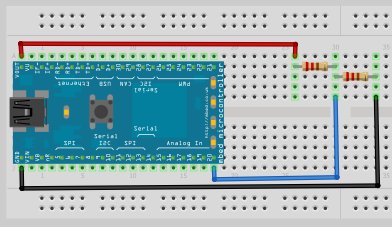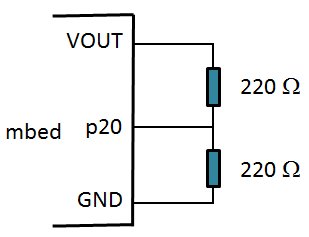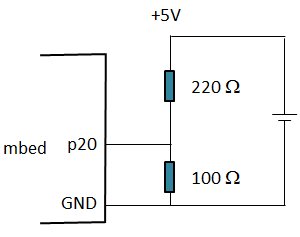Analog Input
Example 1
- Measure voltage using voltage divider rule. You can make use of different combination of resistors.


#include "mbed.h"
AnalogIn ain(p20);
DigitalOut myled(LED1);
int main() {
while (1){
if(ain > 0.3) {
myled = 1;
} else {
myled = 0;
}
}
}
Example 2
 If you need to measure voltage from other power source, you need to ensure that
If you need to measure voltage from other power source, you need to ensure that
- The maximum voltage to mbed must be less than +3.3 V but larger than 0 V.
- The ground pin from mbed must be tied to reference point of measured point.
- mbed has a noise issue with analog input. You may want to use average to smooth out the data.
/*
* The program try to test the phenomenon as mentioned in
* http://mbed.org/users/chris/notebook/Getting-best-ADC-performance/
*
* a) Unused ADC pins are either tied to ground, or declared as DigitalOut
* b) Quality of signal source, including low noise design techniques such
* as filtering.
* c) Reduce debugging communication via USB
*/
#include "mbed.h"
#define SSIZE 100
AnalogIn ain(p20);
BusOut unused(p15,p16,p17,p18,p19); // Make unused analog pin to DigitalOut
float value[SSIZE];
float max;
float min;
double itg;
void printNow()
{
time_t s;
char buffer[20];
s = time(NULL);
strftime(buffer, sizeof(buffer), "%Y-%m-%d %H:%M:%S", localtime(&s));
printf("%s\n", buffer);
}
void printSecNow()
{
time_t s;
s = time(NULL);
printf("%d\n", s);
}
int main()
{
set_time(1323180910);
while (1)
{
//printNow();
printf("\n-----------------\n");
printSecNow();
max = itg = 0.0;
min = 3.3;
// Sample before printing to avoid debug communucation
for (int i=0; i<SSIZE; i++)
{
value[i] = ain;
if (value[i] > max) max = value[i];
if (value[i] < min) min = value[i];
itg += value[i];
}
printSecNow();
// Now print out
for (int i=0; i<SSIZE; i++)
{
printf("%0.3f ", value[i]*3.3);
}
printf("\n");
printf("max=%0.3f, min=%0.3f, avg=%0.3f\n",
max*3.3, min*3.3, 3.3*itg/SSIZE);
wait(10);
}
}
1 comment on Analog Input:
Please log in to post comments.

why no power source, Example 2 ouput around 2.7V